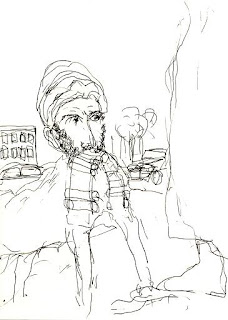 Have you heard the one about the Muslim prophet that walks into the bar? If you have, just start whistling “too-ra-loo-ra-loo-ral” and sneak out the back door with your hands in your pockets. Probably wasn’t that funny anyway. Lars Vilks’ cartoon of Muhammad’s face on a dog’s body was, but he got head-butted in the face and had to scramble off stage for his life last night at a Swedish university. South Park probably had a real foot-stomper lined up last month too, but Comedy Central knew how to get out to get by.
Have you heard the one about the Muslim prophet that walks into the bar? If you have, just start whistling “too-ra-loo-ra-loo-ral” and sneak out the back door with your hands in your pockets. Probably wasn’t that funny anyway. Lars Vilks’ cartoon of Muhammad’s face on a dog’s body was, but he got head-butted in the face and had to scramble off stage for his life last night at a Swedish university. South Park probably had a real foot-stomper lined up last month too, but Comedy Central knew how to get out to get by.Okay, but maybe you’ve heard the one about the jihadist that tries to do jihad because, and here’s the punch-line, he actually believes in jihad? New York Times writer Robert Wright has, and he has heard quite enough of it. The “jihadi intent” theory regarding the Pakistani jiahdist Faisal Shahzad, who tried to put jihad on Times Square earlier this month, is just too “simple,” says Wright. Jihadists like Shahzad are complex: maybe he “feels unhappy,” maybe “alienated.” “Maybe he’s having financial problems,” suggests Wright, speculating on the theoretical jihadist. And most unfunny of all, maybe the “hawkish policies” of the United States “may have helped incite Shahzad.” Killing Anwar al-Awlaki – the Mr. Fireside Chat of jihad– for example, could have a “downside” similar to that of killing Jesus, says Wright. That is, Jesus knows how many Christians just united and went forth and multiplied after that target package. Wright concludes that the downsides of anti-terrorist policies, which often outweigh the upsides, must be confronted.
While Wright presents himself as being above the narrative-proving game, he (and the many Americans that share his ideology) remains stubbornly attached to the same grievance-narrative that he espoused after the lonely Major Nidal Hassan reacted as one does to hawkish policies.
Yet it's quite the opposite: it's unreasonable to attribute rationality to terrorism. A classic example was Sergio Vieira de Mello's assasination in Iraq in 2003 by Islamists, who were mad he had helped oust Indonesia from East Timor. A "hawkish policy" in which "the downsides outweigh the upsides," Wright would ask? No -- it was an anti-genocide policy. So if we are to avoid instigating terrorists, we must promote genocide.
Wright gets the grievance feedback loop exactly backward: it’s not easy to keep up on the mortgage when you're living the dream in Pakistani jihad camps. And concerning Shahzad’s confused “social niche,” the day jihad enthusiasm in America is not inversely proportional to, say, facebook "friend requests," botched car bombings will be the least of our concerns.
Shahzad's internet connection revealed to him the injustice of US drone strikes accidentally killing Pakistani women and children, notes Wright. But wouldn't it also have led him to recurring stories of Muslim Pakistani girls covered with acid for going to school, or stoned for having relationships? Or of Muslim Somali girls genitally mutilated? Or of innocent Muslims being killed by Muslims with hawkish policies daily, all around the world? Most of the evil inflicted on innocent Muslims comes in these forms. (Shariah law, it turns out, differs from the US Army’s Counterinsurgency Manual). So why didn’t this matter? It seems Shahzad was intent on proving a narrative of his own.
Sense of proportions must not be abandoned in this fight. Wright’s comparison of Jesus to Awlaki, the very type of brute Jesus would defy for throwing the first stone at the town whore, is charming in a “gold jacket, green jacket, who gives a s***?" kind-of-way. But maybe if Wright had an example of an enemy of civilization getting killed and being awarded posthumous worshipers...like, I don't know, Imam Ali?...he might have had a stronger point.
Now, had it been a Tea-Partier in Times Square, saying he did it in the name of the Tea-Party, against the non Tea-Partiers, I would say the main cause was probably his radical belief in the Tea-Party. But then there's a, oh...three percent chance of Wright writing about whether the administration should reevaluate the downsides of its hawkish policies on capitalism. What about the downsides of writing about the downsides of hawkish policies, anyway? Terrorists read that and see less shame in terrorism.

All this reminds me of a joke – the one that Sacha Baron Cohen played on the man labeled "terrorist" in his movie “Bruno” (my first major motion picture, if you freeze the shot of Alpha Company). The “terrorist” tried to sue Baron Cohen saying he wasn't a terrorist anymore at the time of filming. The real joke was on us, Wright might argue: how simple-minded of us to accept the label “terrorist” just based on something that happened in the past. I have a feeling I’d find the “Muhammad walks into a bar” joke a bit funnier.

No comments:
Post a Comment